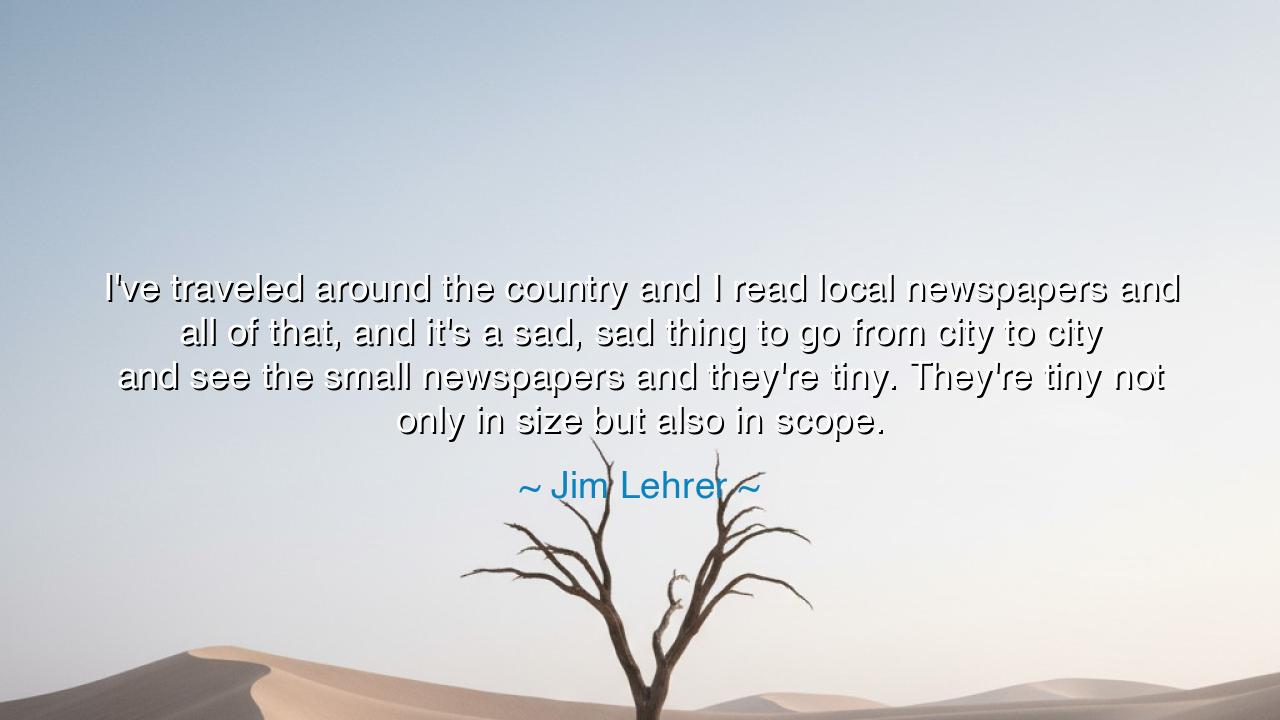
I've traveled around the country and I read local newspapers and
I've traveled around the country and I read local newspapers and all of that, and it's a sad, sad thing to go from city to city and see the small newspapers and they're tiny. They're tiny not only in size but also in scope.






Jim Lehrer, the quiet and steadfast voice of American journalism, once spoke with deep lament and clarity: “I’ve traveled around the country and I read local newspapers and all of that, and it’s a sad, sad thing to go from city to city and see the small newspapers and they’re tiny. They’re tiny not only in size but also in scope.” In these words lies not only nostalgia, but a profound warning—the recognition that when the voice of truth shrinks, so too does the spirit of democracy. Lehrer's sadness is not about the fading of paper and ink, but about the diminishing of connection, the quiet loss of community awareness, and the slow decay of civic responsibility in the hearts of men and women once bound by shared stories.
The origin of this quote reflects Lehrer's lifelong devotion to journalism as both craft and calling. Having spent decades in public broadcasting, he witnessed firsthand the transformation of the news—from a profession guided by integrity and service to a marketplace driven by profit and speed. In his travels across the nation, he saw small-town newspapers—once vibrant chronicles of local life—reduced to shadows of their former selves. These were the papers that once reported every school event, every council meeting, every injustice hidden in the corners of society. To see them “tiny in scope” was to witness not merely an economic decline, but a moral and cultural contraction—the fading of curiosity, depth, and accountability.
In the ancient way of wisdom, Lehrer's words echo the warnings of philosophers who knew that a society dies not from war, but from silence. When the storytellers grow quiet, the people forget who they are. The small newspapers of America once served as the town square—a place where truth met dialogue, where citizens could see their reflections, both noble and flawed. Their disappearance is not a small matter, for when communities lose their chroniclers, they lose their memory. And when memory dies, so too does vigilance. Lehrer's sorrow, therefore, is not sentimental—it is prophetic.
Consider the story of the Roman Republic, where historians and scribes were revered as guardians of truth. When Rome’s chroniclers began to serve emperors rather than the people, the record of reality warped. The people no longer knew what was true, and tyranny found its way into their blindness. In our modern age, the shrinking local press mirrors that ancient decay. As small papers vanish, the narratives of the powerful replace the stories of the common man. Lehrer's sadness, then, is the sadness of a historian watching the flame of public conscience flicker in the wind.
There is also compassion in his observation. He does not mock the small papers that remain; rather, he honors them. To him, even a tiny newspaper is a symbol of hope—a remnant of a time when journalism sought meaning rather than sensation. Yet he grieves that their “scope”—their reach into the complexities of life—has narrowed. In a world overflowing with information, there is less understanding; in an age of constant broadcasting, there is less listening. Lehrer reminds us that the health of a society depends not on how loudly it speaks, but on how deeply it sees.
His words are also a call to the people—to reclaim the habit of paying attention. For journalism is not merely produced; it is sustained by those who read, think, and care. When citizens turn away from truth-seeking institutions, when they trade long-form understanding for quick distraction, the press withers like an untended garden. Lehrer's lament, therefore, is also a summons: to nurture what remains, to support the keepers of truth before they disappear entirely. For when the local voice dies, the nation becomes deaf to itself.
So let this teaching be carried forward: guard your storytellers, cherish your truth-tellers, and never take for granted the small voices that bind your community together. Read the local paper. Ask questions. Care about the world beyond your screen. For as Jim Lehrer warns, a civilization that lets its journalism grow small will soon find its imagination—and its conscience—smaller still. And in that silence, the mighty will write the story of the world as they please, while the people, unknowing and unheard, will drift into forgetfulness. Let us therefore preserve the flame of truth, even if it flickers in small papers—for from such light, the wisdom of nations is born.






AAdministratorAdministrator
Welcome, honored guests. Please leave a comment, we will respond soon